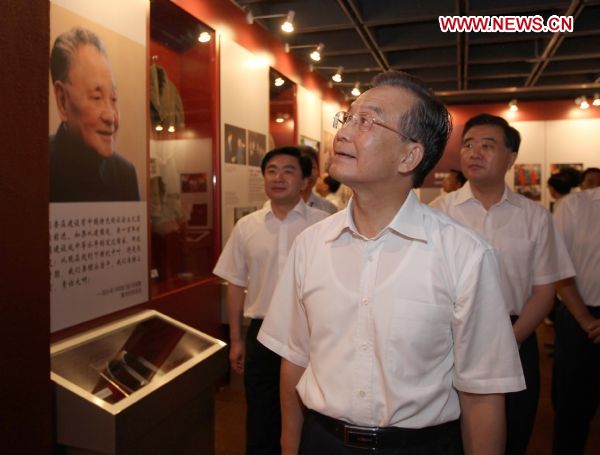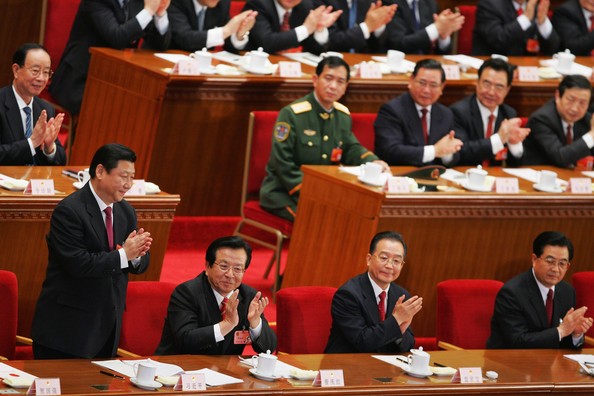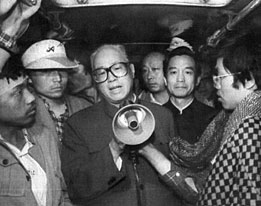Over the past six weeks, China’s thin class of the politically aware has been gripped by a faint hope that maybe, against all odds, some sort of political opening might be in the cards this year. Monday’s conclusion of a key Communist Party meeting didn’t exactly crush this hope, but it did put things in a much more sober perspective.
The excitement began in late August, when Premier Wen Jiabao toured the southern Chinese boomtown of Shenzhen. The one-time fishing village was celebrating the 30th anniversary of its transformation into a Special Economic Zone, where Chinese officials have tested out economic reforms. Mr. Wen used the chance to advocate “political reforms” as well. Most of the time, political reform is a fairly empty phrase in China, almost always meaning a push to make the current system more efficient and slightly more responsive to ordinary citizens’ wishes, for example by opening complaint hotlines or neighborhood centers to make it easier to apply for government services. It never means what some hopeful westerners assume: transformation of China’s authoritarian system.
Still, there were some tantalizing hints, mostly in how the speech was and wasn’t covered in China. The call was given de rigeur coverage by the party’s flagship newspaper, People’s Daily, but no one else picked it up. More pointedly, a subsequent speech by China’s top leader, Hu Jintao, failed to mention political reform, while the party’s top man for security issues, Zhou Yongkang, rejected political reform outright in a talk in the party’s leading theoretical journal, Qiushi.
All this raised the question of whether Mr. Wen’s call really had been so hollow in the first place; if so, then why was everyone taking such care to ignore or rebut it?
By early October the speculation ratcheted up a notch. The party was getting ready for last weekend’s Plenum—a gathering of roughly 300 senior officials who set policy—and many expected this particular session would be important. Not only was Mr. Wen’s call for political reform still in the air but the session was supposed to resolve two key issues: the country’s economic plan for the next five years and a personnel decision that could help choose the successor to Mr. Hu as head of the party and the country’s president. As anticipated, the plenum elevated Xi Jinping, a senior member of the Politburo Standing Committee and Mr. Hu’s heir apparent, to vice chairman of the Central Military Committee, a top military post that is viewed as step to assuming the government’s top leadership position.
But what about the larger question of bringing change to China’s political institutions? Before the plenum began, a group of retired Communist Party officials had issued its own call for reform. Led by one of Mao Zedong’s private secretaries, Li Rui, they represent the last vestiges of a serious reformist wing in the party, one that in the 1980s vigorously supported free speech and even some political reforms such as separating the communist party from the government, so that in theory the ruling party could be changed. After the 1989 Tiananmen Square massacre, they were marginalized and have steadily lost ground. Each year they issue similar petitions that get written up in the foreign press but have no impact in China.
This time, however, there was another twist. During an interview with CNN on September 29, Premier Wen seemed to make absolutely clear what he had meant by political reform during his Shenzhen speech. China, he said, needed “to gradually improve the democratic election system so that state power will truly belong to the people and state power will be used to serve the people.” That sounded like more than the usual calls for making the current system a bit smoother. Was some sort of a debate going to happen at the Plenum?
As tantalizing as it was, such speculation seemed destined to remain mere rumblings among Pekingologists—until the winner of the Nobel Peace Prize was announced on October 8. By awarding Liu Xiaobo the Nobel, the small group of Norwegians crystalized a few things in China. As I recently argued in The New York Review the Communist Party is resurgent and seems in many ways all-powerful. In the rush to take part in China’s remarkable economic growth, foreigners are up to all sorts of unscrupulous activity, such as pumping money into party-run oligopolies and allowing the party’s propaganda apparatus to influence the study of China. And yet here was an award that said, yes, fine, but don’t forget Chinese citizens like Liu, who have struggled for decades for what many people consider to be the basic, universal value of free speech. He is best known for his involvement in drafting Charter 08, which essentially requests that the Chinese government live up to the rights it guarantees in its constitution and give up its monopoly on political power.
Advertisement
The Nobel announcement galvanized some Chinese, with a group of about 100 dissidents and activists petitioning for Liu’s release from prison, where he is serving an eleven-year sentence. Across a broad spectrum of non-governmental organizations and educated people, there is a sense that the prize was certainly deserved. One can nit-pick Liu’s past and find some views (such as his early support for the Iraq war) that show, surprise surprise, that he is not perfect. But overall, politically active people in China can identify with his moderate approach.
All of this has contributed to what is arguably the most hopeful period for political reform in years. In part, this owes simply to the fact that there’s been so little discussion of reform over the past two decades that a few ripples seem like a tidal wave. But there is a genuine sense, even among China’s leaders, that the current system is not sustainable. No one seems to have a specific answer about how to reform China’s political system, but few deny that reforms are overdue.
Still—and here the recent Plenum comes into play—the party is in no mood to be hurried. As is usual after such opaque affairs, it issued a turgid statement that called for “vigorous yet steady efforts” at political reform—which is pretty much a hold-the-course statement. This doesn’t mean that some kinds of political reform aren’t being considered but that the party isn’t ready to move now and basically wants it to mean tarting up the existing system. Exactly how China’s new leadership will move on this is also unclear. Mr. Xi, the presumptive heir to President Hu, has no track record of political reform, being best known for his stewardship of Zhejiang province, one of China’s most economically powerful and robust. That suggests that he is in favor of economic reforms but does not imply he backs any political changes. In any case, he is a cautious figure who, like president Hu, will come into his job without a strong political base to effect change.
Then what about Premier Wen’s calls for voting and free speech? There’s a famous picture of him in Tiananmen Square in May 1989, shortly before the army moved in. He’s standing next to former party secretary Zhao Ziyang—the reformer who addressed the student protestors sympathetically on the eve of the crackdown—whom Wen served loyally. Many say that the premier was harkening back to those heady days when he was firmly in the reformist camp, and that with just two years left on his term he wants to go down in history as a reformist.
But the photo also reminds us how weak Premier Wen really is. Like his predecessor Zhu Rongji—another Chinese leader popular with foreigners—Premier Wen is essentially a hired gun to keep the economy going. He’s done that well during the early years of the 21st century but his earlier support for the Tiananmen protesters means he has no political base among the party brass. The Tiananmen protests are seen by most of the people who run China as an unmitigated disaster and one of the chief lessons is that they should have been dealt with more forcefully and earlier on. Mr. Wen’s role as a last-minute conciliator makes him seem like a weakling. Even now, with his second term ending, he has not been able to build a power base as president Hu was eventually able to do. So, in a way, what he says doesn’t matter. He might well mean to begin a process of democratization and to embrace free speech but he has no power base to push through such a radical vision. At best, what can be expected is noodling around the edges—perhaps giving harmless non-governmental organizations in education or environmental protection a bit more of a role
As for the Nobel award, it is heartening and is wind in the sails of grassroots reformers. But it is probably not more than that. The Plenum essentially set down a marker: for now, the rules of the game aren’t changing.




